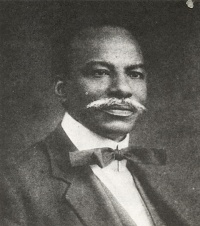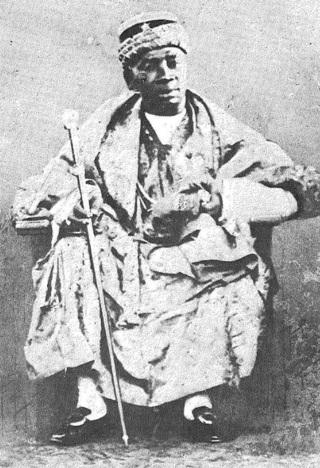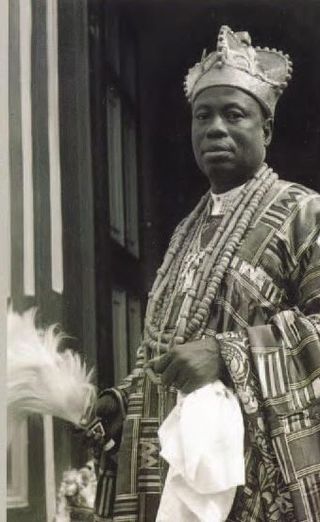Related Research Articles

Olayinka Herbert Samuel Heelas Badmus Macaulay was a Nigerian nationalist, politician, surveyor, engineer, architect, journalist, and musician and is considered by many Nigerians as the founder of Nigerian nationalism.

Efunroye Tinubu, born Ẹfúnpọ̀róyè Ọ̀ṣuntinúbú, was a powerful Yoruba female aristocrat, merchant, and slave trader in pre-colonial and colonial Nigeria.

Lagos is the largest city of the West-African country of Nigeria, and its former capital; it is the third largest city in Africa in terms of population with about 15.3 million people. It is also the 4th largest economy in Africa.

The Oba of Lagos, also known as the Eleko of Eko, is the traditional ruler (Oba) of Lagos.

Oloye Sir Adeyemo Alakija, was a Nigerian lawyer, politician and businessman. He served as a member of the Nigerian legislative council for nine years starting in 1933. In 1942, he became a member of the governor's Executive Council. Alakija was president of Egbe Omo Oduduwa from 1948 until his death in 1952.
Richard Beale Blaize was a Nigerian-Sierra Leonean businessman, newspaper publisher, financier, and black nationalist of Sierra Leonean and Nigerian heritage.
The following is a timeline of the history of the metropolis of Lagos, Nigeria.
Ibikunle Alfred Akitoye (1871–1928) was Oba of Lagos from 1925 to 1928 during what some historians refer to as the "Interregnum" years of the exiled Oba Eshugbayi Eleko. Ibikunle Akitoye was the first western educated and Christian Oba of Lagos. Akitoye's reign also marked the association of Lagos Obas with non-traditional religions.

Oba Sanusi Olusi was a wealthy trader who succeeded Ibikunle Akitoye as Oba of Lagos from 1928 to 1931 during what some historians refer to as the "Interregnum" years of the exiled Oba Eshugbayi Eleko. Oba Sanusi Olusi was a grandson of Olusi, and great grandson of Oba Ologun Kutere. Sanusi Olusi was the first Muslim Oba of Lagos.
Oba Oyekan I reigned as the Lagos Monarch from March 1885 - September 30, 1900. He ascended the throne about a month after the death of his father Oba Dosunmu.
Oba Eshugbayi Eleko, alias "Eleko of Eko", was the Oba of Lagos from 1901 to 1925, and from 1931 to 1932. His father was Oba Dosunmu. Eleko's struggles and legal victory over the British colonial government symbolized the struggle between indigenous rights and colonial rule in Nigeria. The outcome of the "Eleko Affair" led to the Eleko's deposition as Oba and deportation to Oyo between 1925 and 1931, years that some historians now call the "interregnum years", and that saw the reigns of Oba Ibikunle Akitoye and Oba Sanusi Olusi.

Oba Sir Musendiku Buraimoh Adeniji Adele II, KBE was the Oba (King) of Lagos from 1 October 1949 to 12 July 1964.
Chief Alimotu Pelewura, was a Nigerian trader who was leader of the Lagos Market Women's Association, a Lagos-based market women advocacy group. She was also an important political ally of Herbert Macaulay.

Oba Sir Ladapo Samuel Ademola KBE, CMG (1872–1962), also known as Ademola II, was the Alake of Abeokuta from 1920 to 1962. Before he was crowned Alake, Ademola was involved in the affairs of the Egba United Government. As a member of the Egba council, he was a leading participant in negotiations with the Lagos State colonial government in 1889 for the rights to construct railway tracks passing through Egbaland. In 1904 he travelled with Alake Gbadebo to the U.K., where they were received by King Edward VII. He succeeded Oba Gbadebo in 1920 with overwhelming votes from the Egba council.
Chief Daniel Conrad Taiwo, alias Taiwo Olowo, was a trader, arms dealer, slave owner, political power broker, philanthropist and community leader in Colonial Lagos.

Kosoko was a member of the Ologun Kutere Lagos Royal Family who reigned as Oba of Lagos from 1845 to 1851. His father was Oba Osinlokun and his siblings were Idewu Ojulari, Olufunmi, Odunsi, Ladega, Ogunbambi, Akinsanya, Ogunjobi, Akimosa, Ibiyemi, Adebajo, Matimoju, Adeniyi, Isiyemi, Igbalu, Oresanya, and Idewu-Ojulari.
Dosunmu, referred to in British documents as Docemo, reigned as Oba of Lagos from 1853, when he succeeded his father Oba Akitoye, until his own death in 1885. He was forced to run away to Britain under the threat of force in August 1861.
Chief Amodu Tijani Oluwa, also known as simply Amodu Tijani, was a Nigerian Yoruba traditional chief. Coming to prominence in the high colonial period, he was a notable nationalist. He held the title of the Oluwa of Lagos.

The Herbert Macaulay Affair is a 2019 Nigerian film based on the life of Herbert Macaulay, a Nigerian nationalist and proponent of Nigerian independence. It was directed by Imoh Umoren and featured William Benson in the lead role alongside Saidi Balogun, Kelechi Udegbe and Martha Ehinome Orhiere. The film also features Herbert Macaulay's grandson, Wale Macaulay. Other historical figures portrayed in the film include Alimotu Pelewura, leader of the Lagos Market Women's Association, Oba Eshugbayi Eleko, the Eleko of Eko at the time, Amodu Tijani Oluwa, the Chief Oluwa of Lagos and Henry Rawlingson Carr, educator and administrator.
The Olofin Adimula Oodua of Ado-Odo is the Traditional Ruler and Yoruba king of Ado-Odo; he is also referred to as the Oba of Ado. Ado-Odo is the metropolitan headquarters of the Ado Kingdom in Ogun State, Southwestern Nigeria.